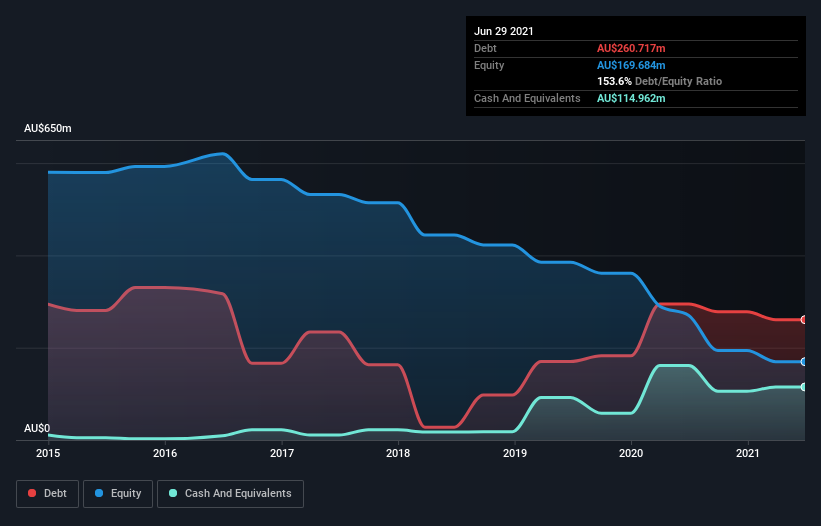The external fund manager backed by Berkshire Hathaway's Charlie Munger, Li Lu, makes no bones about it when he says 'The biggest investment risk is not the volatility of prices, but whether you will suffer a permanent loss of capital.' It's only natural to consider a company's balance sheet when you examine how risky it is, since debt is often involved when a business collapses. As with many other companies Ardent Leisure Group Limited (ASX:ALG) makes use of debt. But the real question is whether this debt is making the company risky.
When Is Debt Dangerous?
Generally speaking, debt only becomes a real problem when a company can't easily pay it off, either by raising capital or with its own cash flow. Part and parcel of capitalism is the process of 'creative destruction' where failed businesses are mercilessly liquidated by their bankers. However, a more frequent (but still costly) occurrence is where a company must issue shares at bargain-basement prices, permanently diluting shareholders, just to shore up its balance sheet. Of course, plenty of companies use debt to fund growth, without any negative consequences. The first step when considering a company's debt levels is to consider its cash and debt together.
View our latest analysis for Ardent Leisure Group
What Is Ardent Leisure Group's Debt?
As you can see below, Ardent Leisure Group had AU$260.7m of debt at June 2021, down from AU$294.8m a year prior. However, because it has a cash reserve of AU$115.0m, its net debt is less, at about AU$145.8m.

How Strong Is Ardent Leisure Group's Balance Sheet?
We can see from the most recent balance sheet that Ardent Leisure Group had liabilities of AU$121.6m falling due within a year, and liabilities of AU$615.4m due beyond that. On the other hand, it had cash of AU$115.0m and AU$1.77m worth of receivables due within a year. So it has liabilities totalling AU$620.2m more than its cash and near-term receivables, combined.
This is a mountain of leverage relative to its market capitalization of AU$683.6m. Should its lenders demand that it shore up the balance sheet, shareholders would likely face severe dilution. The balance sheet is clearly the area to focus on when you are analysing debt. But ultimately the future profitability of the business will decide if Ardent Leisure Group can strengthen its balance sheet over time. So if you want to see what the professionals think, you might find this free report on analyst profit forecasts to be interesting.
In the last year Ardent Leisure Group had a loss before interest and tax, and actually shrunk its revenue by 2.1%, to AU$391m. We would much prefer see growth.
Caveat Emptor
Over the last twelve months Ardent Leisure Group produced an earnings before interest and tax (EBIT) loss. Indeed, it lost AU$30m at the EBIT level. Considering that alongside the liabilities mentioned above does not give us much confidence that company should be using so much debt. Quite frankly we think the balance sheet is far from match-fit, although it could be improved with time. For example, we would not want to see a repeat of last year's loss of AU$87m. So in short it's a really risky stock. There's no doubt that we learn most about debt from the balance sheet. However, not all investment risk resides within the balance sheet - far from it. To that end, you should be aware of the 1 warning sign we've spotted with Ardent Leisure Group .
If, after all that, you're more interested in a fast growing company with a rock-solid balance sheet, then check out our list of net cash growth stocks without delay.
New: AI Stock Screener & Alerts
Our new AI Stock Screener scans the market every day to uncover opportunities.
• Dividend Powerhouses (3%+ Yield)
• Undervalued Small Caps with Insider Buying
• High growth Tech and AI Companies
Or build your own from over 50 metrics.
This article by Simply Wall St is general in nature. We provide commentary based on historical data and analyst forecasts only using an unbiased methodology and our articles are not intended to be financial advice. It does not constitute a recommendation to buy or sell any stock, and does not take account of your objectives, or your financial situation. We aim to bring you long-term focused analysis driven by fundamental data. Note that our analysis may not factor in the latest price-sensitive company announcements or qualitative material. Simply Wall St has no position in any stocks mentioned.
Have feedback on this article? Concerned about the content? Get in touch with us directly. Alternatively, email editorial-team (at) simplywallst.com.
About ASX:CEH
Coast Entertainment Holdings
Engages in the investment, ownership, and operation of leisure and entertainment businesses in Australia.
Reasonable growth potential with adequate balance sheet.
Similar Companies
Market Insights
Community Narratives



